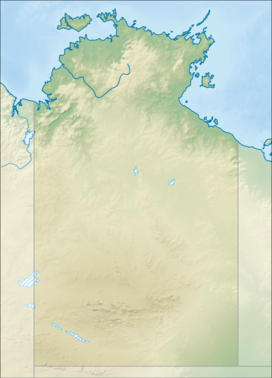Mount Liebig
| Mount Liebig | |
|---|---|
 Viewed from the Gary Junction Road looking east. | |
| Highest point | |
| Elevation | 1,274 m (4,180 ft)AHD |
| Coordinates | 23°17′16″S 131°21′51″E / 23.287906°S 131.3643°E[1] |
| Naming | |
| Etymology | Justus von Liebig |
| Geography | |
| Location | Kunparrka. Northern Territory, Australia[1] |
| Parent range | MacDonnell Ranges |
Mount Liebig is a mountain with an elevation of 1,274 metres (4,180 ft) AHD in the southern part of the Northern Territory of Australia. It is one of the highest peaks of the MacDonnell Ranges and was named by the explorer Ernest Giles after the German chemist Justus von Liebig.[2] Nearby settlements include Haasts Bluff.
The killing of two Aboriginal men at Mount Liebig in 1932[3] according to traditional law led the missionary Ernest Kramer to demand the prosecution of the killers for murder, leading to debate on the applicability of white law to traditional violence. The men were tried but acquitted by a Darwin jury.[4]
Notable Aboriginal Australians who have lived in the region of Mount Liebig include Indigenous artist Nora Andy Napaltjarri[5] and Ngoia Pollard Napaltjarri.[6]
See also
[edit]References
[edit]- ^ a b "Place Names Register Extract for "Mount Liebig" (Mount)". NT Place Names Register. Northern Territory Government. Retrieved 18 March 2019.
- ^ Ernest Favenc: The History of Australian Exploration from 1788 to 1888. Echo Library 2006, ISBN 978-1-4068-2067-6, p. 184
- ^ "Native murder reported: two men found speared at Mt. Liebig". The Advertiser. Adelaide. 6 August 1932. Retrieved 24 August 2020.
- ^ Batty, Philip (2013). "Murder, infanticide and the moral certainty of Ernest Kramer" (PDF). Journal of the Anthopological Society of South Australia. 37: 107–125. Retrieved 24 August 2020.
- ^ Johnson, Vivien (1994). Aboriginal Artists of the Western Desert: A Biographical Dictionary. Roseville East, NSW: Craftsman House. pp. 60–61.
- ^ McCulloch Childs, Emily; Gibson, Ross (2008). New Beginnings: Classic Paintings from the Corrigan Collection of 21st Century Aboriginal Art. Fitzroy, VIC: McCulloch & McCulloch Australian Art Books. p. 106. ISBN 978-0-9804494-4-0.
External links
[edit]- Mt. Liebig at www.peakbagger.com; (retrieved 2009-9-3)
- Mount Liebig and Surrounds (pdf) - brochure by the government of the Northern Territory (retrieved 2009-9-3)

